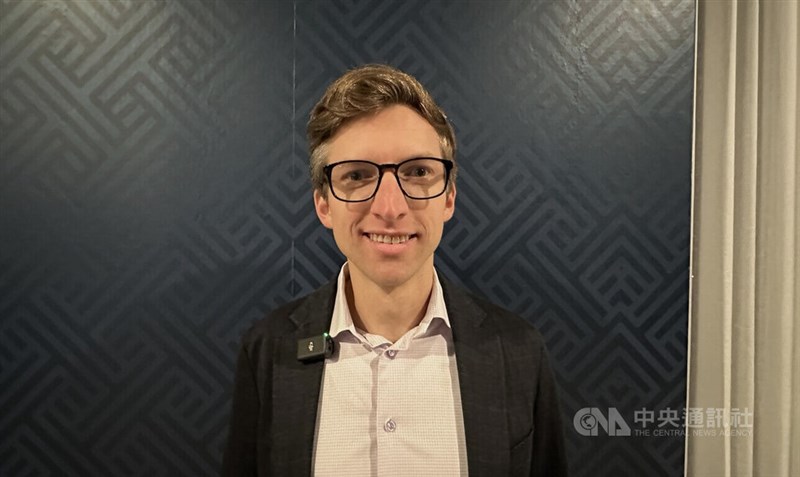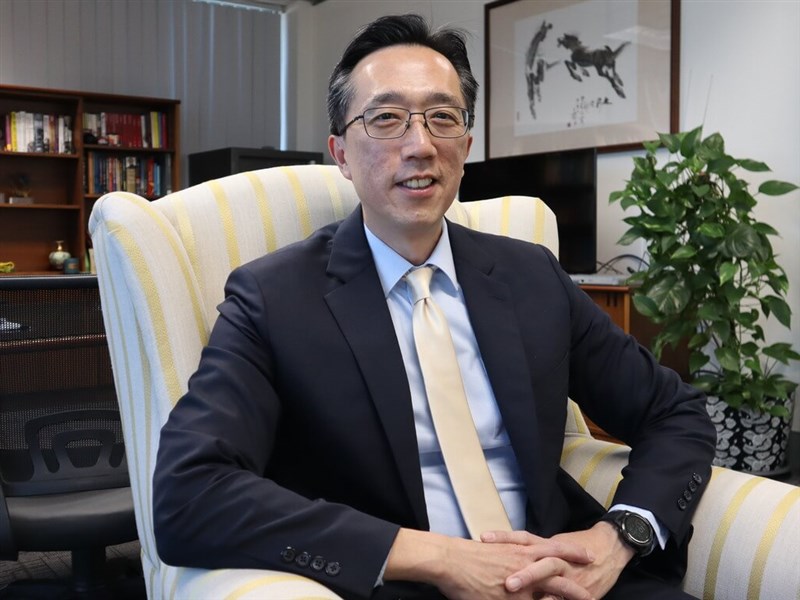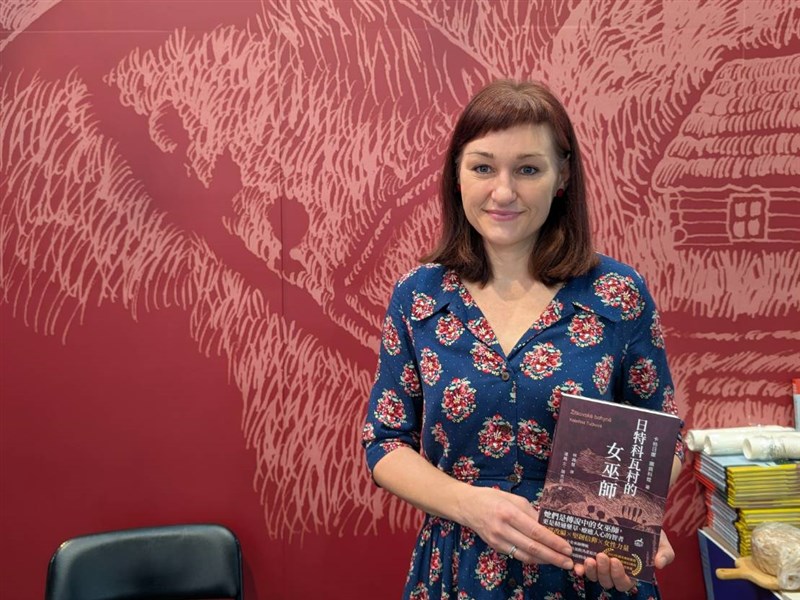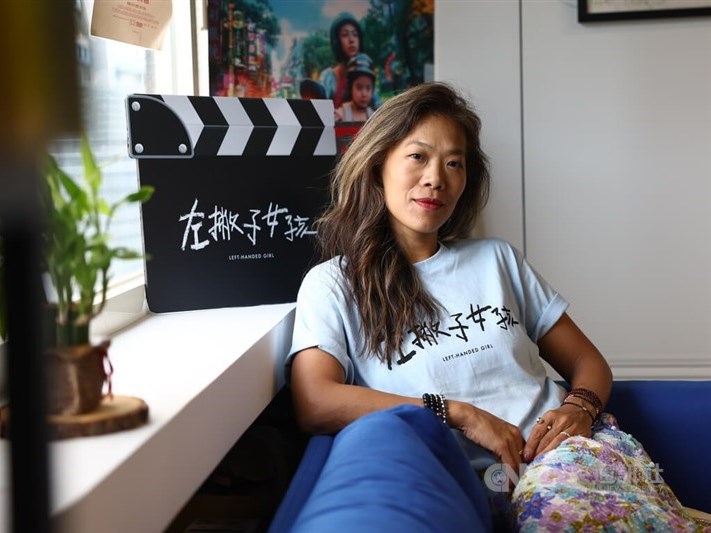INTERVIEW / Taiwan needs to compete in whole value chain not only in chips: 'Chip War' author

San Jose, California, Nov. 21 (CNA) To maintain its competitiveness in the global semiconductor industry, Taiwan needs to compete in the entire value chain instead of only in chip manufacturing, Chris Miller, author of the international bestseller "Chip War," said on Thursday.
Speaking with CNA on the sidelines of the Robert N. Noyce Award ceremony hosted by The Semiconductor Industry Association (SIA) in San Jose, Miller said Taiwan has already played a critical role in chip production, making an artificial intelligence era possible.
"But there's so much more value that we created across the value chain by artificial intelligence," Miller said. "So I think the challenge for Taiwan is to make sure it's competing in a whole variety of value chain steps, not only the chips, where Taiwan is already very, very capable, but also in the software and application layers as well."
Miller said AI has changed the landscape of the global semiconductor industry as software is expected to become a very important part of the industry, while now the focus is still on chips and infrastructure.
"AI will accelerate those changes," Miller said. "I think it's important for countries to think about ... the AI technology stack as well."

Taiwan Semiconductor Manufacturing Co. (TSMC) Chairman C.C. Wei (魏哲家) and the company's former chairman, Mark Liu (劉德音), both received the Robert N. Noyce Award -- the semiconductor industry's highest honor -- on Thursday.
Miller said TSMC leaders were honored by the award as the chipmaker has become a central player in the global semiconductor ecosystem that has benefited both Taiwan and the United States through their cooperation and the award was evidence that such cooperation will continue for a long time.
"I think the U.S. ecosystem is always going to exist in collaboration with the Japanese and the European and the Korean and the Taiwanese chip ecosystem," Miller said. "No country is going to be self-sufficient."
Still, Miller said, the sentiment in the global semiconductor industry appeared mixed as worries over geopolitical tensions are growing, while an extraordinary surge in AI investments has pushed up demand for chips.
Amid growing geopolitical unease, the restructuring of the global supply chain has been underway, posing more challenges to the global semiconductor industry, Miller said, but he added that Taiwan is not unique in its need to navigate the turbulences.
"The reality is, if you got a technology everyone else requires, then geopolitics is just gonna be less impactful, because everyone needs your technology," Miller said, praising TSMC, which manufactures about 90 percent of high-end chips in the world, for its importance, as everyone in the world needs chips that the company produces.
Miller told CNA that he is planning to visit Taiwan by the end of this year after his previous visit in March, to attend a forum organized by the Research Institute for Democracy, Society and Emerging Technology (DSET).
-
![Taiwan's top envoy to Australia seeks cooperation on minerals, drones]() Taiwan's top envoy to Australia seeks cooperation on minerals, dronesAs Australia looks to recalibrate its economic relationship with China, Taipei is hoping to strengthen bilateral ties and partner with Canberra in such areas as critical minerals and drones, said Douglas Hsu (徐佑典), Taiwan's representative to Australia.02/26/2026 11:16 AM
Taiwan's top envoy to Australia seeks cooperation on minerals, dronesAs Australia looks to recalibrate its economic relationship with China, Taipei is hoping to strengthen bilateral ties and partner with Canberra in such areas as critical minerals and drones, said Douglas Hsu (徐佑典), Taiwan's representative to Australia.02/26/2026 11:16 AM -
![Czech author reflects on cultural erasure under authoritarian rule]() Czech author reflects on cultural erasure under authoritarian ruleWhen best-selling Czech author Kateřina Tučková was in Taiwan earlier this month to promote the Chinese version of her novel "The Last Goddess," she said she felt the story would resonate with Taiwanese readers because of a common authoritarian past.02/22/2026 04:35 PM
Czech author reflects on cultural erasure under authoritarian ruleWhen best-selling Czech author Kateřina Tučková was in Taiwan earlier this month to promote the Chinese version of her novel "The Last Goddess," she said she felt the story would resonate with Taiwanese readers because of a common authoritarian past.02/22/2026 04:35 PM -
![Director Tsou Shih-ching challenges gender norms in 'Left-Handed Girl']() Director Tsou Shih-ching challenges gender norms in 'Left-Handed Girl'Superstitions passed down through generations can shape people's lives in subtle yet lasting ways. In her debut solo feature film "Left-Handed Girl" (左撇子女孩), director Tsou Shih-ching (鄒時擎) uses one such belief to examine gender roles and social expectations imposed on women in Taiwanese society.02/22/2026 11:04 AM
Director Tsou Shih-ching challenges gender norms in 'Left-Handed Girl'Superstitions passed down through generations can shape people's lives in subtle yet lasting ways. In her debut solo feature film "Left-Handed Girl" (左撇子女孩), director Tsou Shih-ching (鄒時擎) uses one such belief to examine gender roles and social expectations imposed on women in Taiwanese society.02/22/2026 11:04 AM
-
Business
Taiwan to raise natural gas prices by 3% on average in March
02/28/2026 09:14 PM -
Politics
Taichung mayor to visit U.S. in mid-March
02/28/2026 08:52 PM -
Politics
Taiwan closely monitoring situation after U.S., Israel strike Iran: Lai
02/28/2026 08:31 PM -
Politics
Taipei Mayor Chiang Wan-an remembers 228 Incident, seeks to transcend tragedy
02/28/2026 08:23 PM -
Politics
Taiwan raises Israel travel alert amid U.S.-Israel strikes on Iran
02/28/2026 08:01 PM


